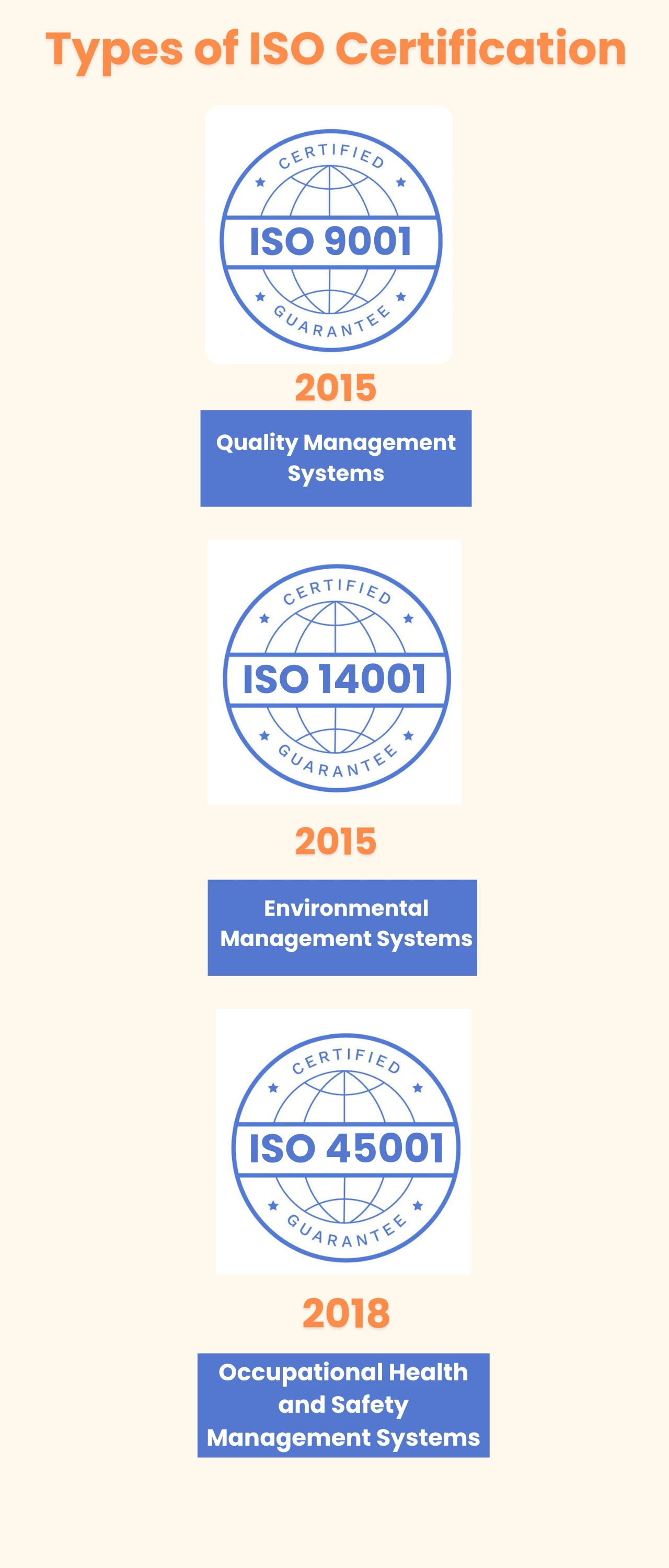OVERVIEW
What is ISO Certification?
The International Organization for Standardization (ISO) is a global body that develops and publishes standards to ensure quality, safety, and efficiency across industries. ISO standards provide frameworks for consistent processes, products, and services, fostering trust and interoperability worldwide.
For businesses, ISO certification enhances credibility by demonstrating compliance with rigorous international benchmarks. It streamlines operations, reduces waste, and boosts customer confidence, giving certified companies a competitive edge. In India, ISO certification is vital for startups and enterprises aiming to scale efficiently and establish market trust.
Benefits
Benefits of ISO Certification
ISO Certification in India can provide you with several benefits, including
- Customer Satisfaction: Long-term business success depends on meeting accepted quality standards since it increases customer satisfaction.
- Market Competitiveness: Companies can differentiate themselves from uncertified rivals by obtaining ISO certification, which gives them a significant competitive advantage.
- Corrective measures and internal audits: Ongoing compliance and improvement are guaranteed by routine internal audits and the execution of action plans for any audit results.
- Surveillance Audits: Companies must undergo surveillance audits after certification to preserve their ISO status and guarantee ongoing adherence to pertinent standards.
- Various Certification Types: Depending on their unique requirements, organizations can select from multiple ISO certifications, including ISO 20000 for IT service management and ISO 9000 for quality management.
- Access to Government Tenders: ISO certification is often a prerequisite for participating in government tenders and contracts. Certified organizations demonstrate compliance with international standards, making them eligible for lucrative public sector projects.
- Global Business Recognition: Achieving ISO certification signals to international partners and clients that an organization adheres to globally recognized standards, fostering trust and facilitating expansion into global markets.
- Sustainability and Environmental Responsibility: Certain ISO standards, like ISO 14001, focus on environmental management, enabling organizations to adopt sustainable practices and enhance their corporate social responsibility profile.
Process
ISO Certification Process in India
Here’s a simplified step-by-step guide to obtaining ISO certification in India:
1. Selecting an ISO Certification Body (ISO Registrar):
As stated above, ISO does not provide a company's certification. It needs to be done by the external certification bodies. Thus, it is mandatory to recognise the credible certification body. When selecting a certification body, the entrepreneur has to follow the things listed below.
- Evaluate several certification bodies
- Check if the certification body uses the relevant CASCO standards
- Check whether the certification body is accredited.
_1761739480.webp)
2. Submit an Application
After choosing an ISO standard and ISO certification organization, the business owner or applicant must submit an application using the format specified by the ISO registrar. The application should cover liability concerns, confidentiality, access rights, and the rights and responsibilities of the entrepreneur and certification body parties.
3. Review of Documents by the Registrar
The ISO certification authority will examine all quality manuals and papers about the different policies and procedures that the organization follows. Examining current works will assist the ISO registrar in determining any potential discrepancies with the specifications outlined in the ISO standards.
4. Identifying Pre-assessment Requirements
Before the regular registration assessment, the Registrar will allow the organization to address any major weaknesses or omissions in the system through the pre-assessment, which is an initial review of the organization's quality management system.
5. Make a Plan of Action
The applicant or business owner must create an action plan to close the holes in the organization after the ISO registrar has informed them of them. The action plan should include the tasks that must be completed to comply with the Quality Management System.
The entrepreneur may need to teach staff members to operate effectively to develop a quality management system. Ensure that everyone in the company is aware of the ISO requirements for quality and job efficiency.
6. Closure of Non-Conformities
To audit the organizational changes, the ISO registrar will physically visit the site. If the Registrar discovers anything during the Audit that does not adhere to the ISO standards, the Registrar assesses the issue's severity. Typically referred to as nonconformities, audit results are classified into one of two groups based on their severity level.
- A minor non-conformance refers to small violations of protocols or systemic failures to meet ISO standards.
- The term "major non-conformance" refers to situations in which nonconforming items are likely to be delivered to customers or a breakdown in the quality system makes the system ineffective in fulfilling the standards.
7. The Final Audit
The final audit will be until the Registrar has closed and confirmed all major nonconformities; the registration cannot proceed. A re-audit of the impacted regions and, of course, the related expenses are typically required for this. A corrective action plan is necessary for minor nonconformities, which will be closed during the initial surveillance.
8. Obtain an ISO Certification
The registrar will award ISO certification if all non-conformities have been resolved and all findings have been updated in the ISO audit report.
ISO Compliance
Maintaining ISO Compliance
Frequent Internal Audits
You must carry out frequent internal audits to keep your certification. These audits help you find areas for improvement and ensure your procedures align with ISO standards.
Modernising Systems for Quality Management
You need to maintain your Quality Management System (QMS) current. Your QMS should adapt to new possibilities and challenges as your company expands or evolves. ISO Certification Renewal
Types of ISO Certification
Discuss various standards of ISO Certification relevant to different industries (Only 6)-
ISO 9001:2015 - Quality Management Systems
ISO 14001:2015 - Environmental Management Systems
ISO 45001:2018 - Occupational Health and Safety Management Systems
ISO 18001:2007 - Occupational Health and Safety Management Systems
ISO 27001:2013 - Information Security Management Systems
ISO 50001:2018 - Energy Management Systems
ISO 22000:2018 - Food Safety Management Systems
ISO 26000:2010 - Social Responsibility
ISO 55001:2014 - Asset Management
ISO 31000:2018 - Risk Management
ISO 10002:2018 - Compliant Management System
Looking for other ISO certifications? We can help you with those, too.

Required Documents
Documents Required for ISO Registration
List essential documents with additional context:
✅ Copy of PAN Card - Identity verification
✅ Aadhar Card or Voter ID - Address proof
✅ Certificate of Incorporation and Memorandum of Association (for companies)
✅ Passport-sized photograph - For an application form
✅ Proof of business address (electricity bill, sale deed, or rent agreement)
✅ Quality manuals and other relevant documentation. - For compliance audit
Validity & Cost
ISO Certification Validity
Usually, ISO certifications are valid for three years. You must pass a renewal audit comparable to the original certification audit to renew. This guarantees that your company will always adhere to ISO requirements.
Requirements for Audit and Documentation for Renewal
You must submit updated documentation for renewal, including internal audit findings, process modifications, and any remedial measures implemented. The certifying authority will examine these and conduct an audit to guarantee continued conformity.
Cost of ISO Certification
Depending on the particular standard, the organization's size and complexity, and the certifying authority, the cost of ISO certification in India varies significantly. Basic certificates like ISO 9001 typically cost between ₹3,999 and ₹8,000, but more complicated certifications or those for larger organizations may cost between ₹50,000 and ₹2,00,000 or more. Recertification and maintenance audits also come with recurring fees. The following are some of the variables that affect ISO certification costs:
- The company's size, including the number of workers and procedures and their intricacies
- Standards applied to the number of places
- Hazards related to the provided services or goods.
As a result, the price may reach one lakh for three years. ISO certifications typically have a three-year validity span. Companies can request recertification before the three-year period has passed.
Timeframe for Obtaining ISO Certification
Obtaining ISO Certification in India can take some time, depending on the company size, the standard chosen, and other relevant factors. The timeline for obtaining ISO certification in India typically ranges from 4 to 7 working days for small and medium businesses using well-organised services like JustStart. However, more complex certifications involving accredited bodies can take up to a few weeks, depending on the company's readiness and audit requirements.
Why Choose JustStart?
Why Choose Us for ISO Certification?
JustStart can help you receive your ISO Certification no matter what standard you choose. With our proven track record and expertise, we make sure that the process is smooth for you. This is regardless of the size of your organization or the industry you are involved in!
✅ Offers complete assistance, including audits and paperwork.
✅ Provides clear expenses and fair prices.
✅ Guarantees a quicker processing time with an experienced workforce.
✅ Issues certifications and includes certification for several ISO standards at once.
✅ Makes it easier to verify the legitimacy of ISO certifications.
So, are you ready to grow your business with JustStart? Get ISO Certified in 2 Days – Book Your Free Consultation Now!

Locations
ISO Certification in Other States and Cities
FAQs
LET'S CLEAR ALL THE DOUBTS!
An independent organization called ISO (International Organisation for Standardisation) creates standards to guarantee the effectiveness, safety, and quality of the goods and services that your companies or organizations offer.
By following globally accepted standards, an organization can demonstrate its dedication to quality, safety, and efficiency, boosting credibility, streamlining operations, and even providing a competitive advantage. This is the primary goal of ISO certification.
Any business, regardless of size or sector, can gain from ISO certification. Still, it's especially beneficial for companies seeking international recognition, improving quality control, or satisfying particular legal or consumer criteria.
Although obtaining ISO certification is a choice, some businesses may mandate it as a prerequisite for doing business with them.
ISO certifications come in various forms, such as ISO 4217 for currency codes, ISO 22301 for business continuity management, ISO 20000-1 for IT service management, and ISO 9000 for quality management.
Compiling your company's information and filling out an application form is the initial step. For official correspondence, you must provide documentation like your Aadhaar card, import-export code, and letterhead, along with a description of the kind of ISO certification you seek.
The intricacy of the business and the standard being used determine how long it takes to become ISO certified. The procedure typically takes three to six months. This covers planning, record-keeping, instruction, audits, and ultimate certification.


